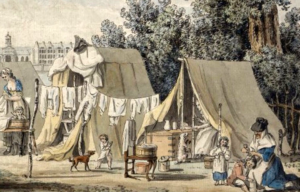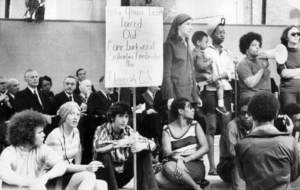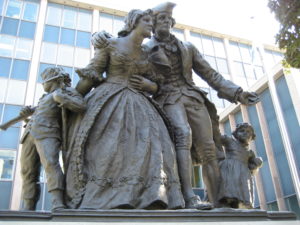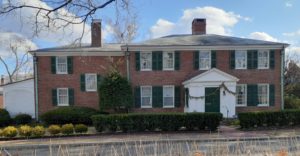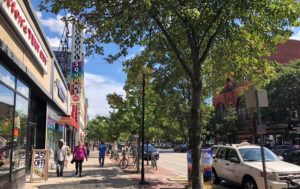Boston Women’s Community Radio, 1972-1993
Amelia Zurcher, Summer 2019 Programs Intern
While the 1971 takeover of an underutilized Harvard University building and the establishment of the Cambridge Women’s Center is well-known, fewer people know the history of how Cambridge-based women claimed space on the radio waves.
Boston Women’s Community Radio (BWCR), based at the Massachusetts Institute of Technology (MIT), aired annual broadcasts that addressed both local and international social justice concerns. BWCR emerged from the annual International Women’s Day (IWD) Celebration radio broadcasts of the 1970s, which provided 24 hours of cultural content through music, poetry, and stories by and about women on WMBR-FM. The IWD Radio Project also promoted dialogue about political and social issues relating to women such as homelessness, women’s health, lesbian parenting, the women’s movement in the Middle East, and organizing of Central American women. Operating out of a basement at MIT, this group officially incorporated as a nonprofit under the name Boston Women’s Community Radio in the 1980s.
While often focused on issues and arts on a national or international level, the program also focused on local activities, often highlighting poets from Cambridge and Dorchester housing project writing centers who read poems about hardship, dreams, and family.
According to the radio program’s introduction of these writers:
“For the women of the Jefferson Park,
Roosevelt Towers, and Franklin Hill writing groups writing is power, a way to
take control of their lives. The Writing Center began 6 years ago at the
Jefferson Park housing development in North Cambridge. Other groups formed
later at Roosevelt Towers in East Cambridge and Franklin Hill in Dorchester.
The writers give public readings of their work and publish a yearly literary
magazine called Hear My Soul’s Voice. Through their writings these women share
their dreams, inspirations, and intimate thoughts. Their words come from the
heart, from the soul, and from life.”
Beyond this, the IWD Radio Project addressed local issues faced by black playwrights and actresses in the Boston area and confronted racial prejudice in Australia through the story of a black Australian student at Harvard University in Cambridge.
Featuring local women as speakers and artists, alongside global music interludes and segments about international women’s movements, Boston Women’s Community Radio demonstrated a commitment to connecting women’s issues and activism between Cambridge communities and other parts of the world.
The radio program acted as a training ground for local feminist community groups. Influenced by earlier activist movements, the creators of Boston Women’s Community Radio also showed an engagement with feminist issues, particularly through a medium in which women previously had little voice.
Prior to BWCR’s establishment, similar feminist actions unfolded across the river and on the airwaves. In 1970, a takeover of the Boston radio station WBCN by feminist-liberating organization Bread and Roses signaled a need for women-led programming. Offended by the language used in a WBCN job advertisement about the type of work available for “chicks,” thirty members of Bread and Roses stormed the Boston office with live chicks in hand. One person reportedly said, “These are chicks – I am a woman.” The protesters demanded that they be given an hour to broadcast their message about the unequal representation and treatment of women in radio media. WBCN granted a one-hour segment to these women.
Transcript from the broadcast by Bread and Roses:
“We took an action against WBCN and that’s why we’re here. Women from Bread and Roses demanded an hour of time on WBCN because we are angry. We are angry at a society that denies us the right to our own identities and destinies. Good little girls will grow up to keep houses and have babies…On WBCN we hear that women are chicks who groove with dudes and keep house at the office. We also hear in music of the hip revolution that women are stupid…dogs, the worst thing in the world. We have taken the right to speak out. We use our own voices although [the disc jockey] of WBCN said that the female audience would much rather hear a man’s voice. We say let the women decide.”
The news of this activist moment reached radio stations across the country and paved the groundwork for feminist programs like those at MIT.
Activists in Cambridge over the years have used a range of media outlets to communicate their messages and visions for change. In the 1970s and 1980s, community radio played an important role in social movements, as it reached a broad and local audience. This channel of activism played a particularly important role in the feminist movement in Cambridge and the greater Boston area. Not only did radio function as a way to facilitate dialogue about feminist issues and ideas; these broadcasts took on a dual role of activism by pointing out the lack of representation of women in radio media.
Further Reading:
Carter Alan, Radio Free Boston: The Rise and Fall of WBCN (Boston: Northeastern University Press, 2013).
Deborah Blackwell, “Now on air: The women,”The Harvard Gazette (October 28, 2016).
Dale M. Brumfield, Independent Press in D.C. and Virginia: An Underground History (Charleston,SC: The History Press, 2015), 73.
Records of Boston Women’s Community Radio, 1972-1993, 1980-1999, Schlesinger Library.
Ellen Shub, IWD Radio 1982, Photographs.

